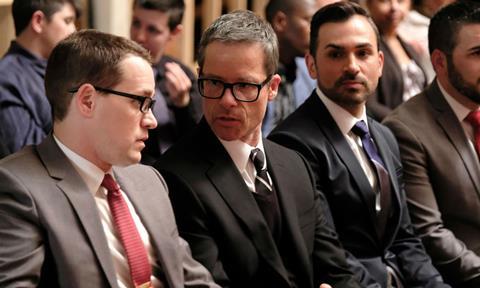The actor talks about playing real-life activist Cleve Jones in ABC’s drama about the gay-rights movement.

Guy Pearce says he did not hesitate when it came to signing on to star in ABC’s recent four-part miniseries When We Rise. The show, created by Dustin Lance Black, chronicles the gay-rights movement from protests against police brutality in 1970s San Francisco to the same-sex marriage ruling by the US Supreme Court in 2015.
Pearce, who plays LGBTQ rights activist Cleve Jones, was immediately struck by the material. Black had previously written the screenplay to Milk, the biopic centred on LGBTQ-rights pioneer Harvey Milk who was an early mentor to Jones, which Pearce describes as “most impressive. [On When We Rise], Lance and the writers had done a really poignant and affecting job in squeezing 40 years of history into a short miniseries, which was quite the task.”
The real-life Jones is a towering figure in the LGBTQ community and a consultant on the show, which is produced by ABC Studios, Hungry Jackal Productions and Laurence Mark Productions. Pearce says that meeting him was an intimidating prospect. “It’s nerve-wracking whenever you play anybody who really exists,” he says, “but when you play somebody who still exists and is at the forefront of a movement… it made me very nervous.”
Pearce admits hoping that, “as misguided as it might have been”, his turn as a drag queen in the highly lauded 1994 film The Adventures Of Priscilla, Queen Of The Desert would give him some credibility with Jones. Whether that was the case or not, he describes conversations with Jones as fruitful.
“He was keen to be sure this project honoured the history and his part in it,” the actor recalls. “It also became apparent that the fight is not over. We’re recounting a history and trying to present it in a way that hopefully affects a contemporary audience who may need to be woken up when it comes to LGBT rights and the rights of the repressed.”
Ongoing challenge
As Pearce began to dive into the role and subject matter, he was surprised at the level of complacency around challenges the LGBTQ community continues to face, and viewed the show as a real opportunity for change. “In When We Rise, [my character] talks to a young interviewer and tells him the greatest hurdle we face is the younger generation who have no idea what the fight was, and have no idea that you actually have to keep fighting.”
Pearce felt an intense connection to, and was deeply moved by, the stories of young people finding their own communities in San Francisco and New York in the 1950s, ’60s and ’70s. “Those young men were desperately trying to have their voices be heard, and desperately trying to feel like they were valid. Trying to feel like to be a young homosexual was actually alright,” he explains.

Immersing himself in the research proved an emotional experience for the actor, best known for his film roles in the likes of Memento, LA Confidential and The King’s Speech. He was affected not only by the charged history, but also by the responsibility he felt in playing the role and representing the LGBTQ community. “You can’t ignore the lives that have been affected, either positively or negatively, through this history, and I had to remind myself that it was OK that I was playing this role,” he says. “Because it’s very easy to feel like you may not measure up.”
When We Rise was filmed during the lead up to the 2016 US presidential election and, as the prospect of a Donald Trump presidency loomed, Jones spoke to Pearce and the cast about the increased need for activism and awareness. And the actor sees today’s political climate as the perfect time for projects such as When We Rise to come to the fore, particularly as a response to the right-wing rhetoric and policies of president Trump. He is not alone in that view: the first episode was watched by 3 million viewers when it premiered on ABC in the US on February 27.
“It’s important to make sure that what has been fought for over these years doesn’t get stamped out now by who is in power,” Pearce observes. “If they’re trying to prove that global warming is fake and homosexuals shouldn’t have the same rights as other people, the voices against that need to get louder. Television shows have a great effect on the community. It is more important now that shows like this and things that balance the scales continue to be made and continue to be presented.”
























No comments yet